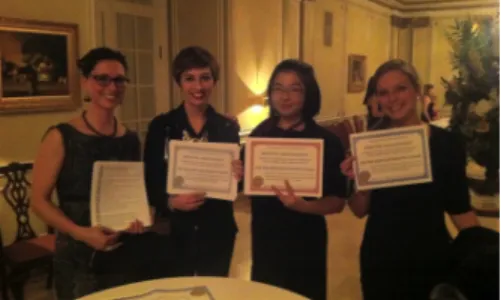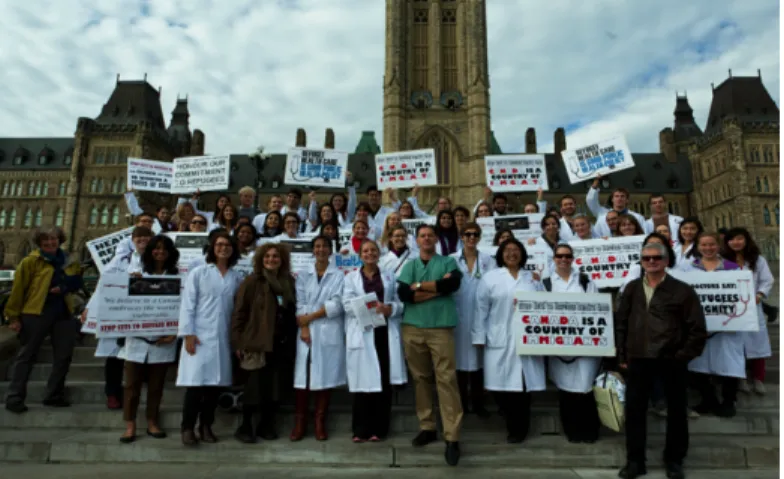P a g e 4 5 | U O J M V o l u m e 4 I s s u e 1 | M a y 2 0 1 4
News
Healthcare is political: case example of physician advocacy in response
to the cuts to refugees’ and claimants’ healthcare coverage under the
Interim Federal Health Program
Rebecca Warmington, BHum
1, Dolly Lin, BHSc
11Faculty of Medicine, University of Ottawa
INTRODUCTION
“Healthcare is political.” That phrase seems obvious. While healthcare is constitutionally a provincial responsibility, it has become a hallmark of Canadian federalism with all levels of government taking part in its function. Furthermore, it has be-come one of the core Canadian values, with Canadians continu-ing to place healthcare as the strongest symbol of their national identity. Yet, as future physicians, medical students are wary of “getting political” in fear of taking sides, loosing impartiality, and losing focus on patient care. However, political actions and issues can have a significant impact on the clinical practices of all physicians. This article will argue that changes to the Interim Federal Health Program (IFHP) have hindered the ability of phy-sicians to provide best practice, evidence-based medicine, and will outline how members of the medical profession, including University of Ottawa medical students, have played an important role in advocating for those affected by the changes to the IFHP.
In April of 2012 the federal government announced changes to the IFHP, a health insurance program developed in 1957, intended to provide temporary coverage to refugees, refu-gee claimants, and protected persons who are not covered by provincial or territorial health insurance plans. Prior to June 2012, the IFHP covered medical care, diagnostics and laboratory testing similar to that covered by provincial health plans. The IFHP also covered medications, emergency dental and vision, similar to what is available to people on provincial social assis-tance plans [1].
The changes announced in 2012 created different tiers of coverage for eligible individuals based on their refugee status in Canada. Most refugees (those found by the Government of Canada to be refugees or persons in need of Canada’s protection following an examination of their case) and refugee claimants (those awaiting a decision on their case in Canada) lost supple-mental coverage for prescription medication, vision and dental care. Refugee claimants from countries designated by the Gov-ernment of Canada to not normally produce refugees and failed claimants [2], and those whose cases are determined to not fit the definition of a refugee, retained coverage only for issues pos-ing a risk to public health and safety [3].
The reduction in coverage is resulting in negative health outcomes for refugees and claimants, while also making it dif-ficult for health practitioners to follow best practices and provide evidence-based care. The following case study describes a hypo-thetical case that illustrates the challenges facing individuals and
practitioners affected by the changes to the IFHP.
CASE
You are a third year medical student working at a fam-ily medicine clinic seeing Ahmad Awatt, a 30 year old male. The doctor agrees to see him despite the fact that he does not have a valid OHIP card. He gives a vague history of being born with a disease involving copper build-up in his body and his older brother having the same condition. You think of Wilson’s dis-ease. Ahmad outlines that, beginning at age 20, he progressively developed difficulty pronouncing his words and developed a rest-ing tremor in his right hand. Back at home, his doctor gave him daily pills and he had regular tests of his urine and blood, but his speech impediment persisted despite treatment [4].
His physical exam was unremarkable, with the excep-tion of a pigmented ring around the outer rim of his cornea. On further history, Ahmad tells you he came to Canada last year. He says he had brought medication with him, but he only has a few pills left. He has tried to see a doctor to refill his prescription, but has been turned away at the reception of 5 other clinics. He says he is grateful you are seeing him today.
While waiting to review your history and physical exami-nation with your supervising physician, you look up some infor-mation on Wilson’s disease. Your search supports your suspicion that Mr. Awatt has primarily pseudosclerotic neurologic Wilson’s disease [5,6]. For investigations, you plan to suggest a urine test looking for copper, and genetic testing to confirm the diagnosis, and then a workup for hepatic and neurologic complications with consults to specialists, and re-initiation of chelation therapy as soon as possible [7].
You review this case with your preceptor and she ex-plains that Ahmad is lucky because the neuropsychiatric mani-festations of Wilson’s disease has better prognostics than the hepatic manifestations, and Ahmad is typical in that 50% of neu-rologic symptoms, like his speech impediment, worsen or do not improve with chelation therapy. Your preceptor agrees with your suggested plan to re-initiate chelation therapy with D-penicilla-mine or Trientine (the pills he is likely taking), but notes that this requires close follow-up for dose titration to target urinary cop-per excretion, therefore Ahmad will need to return to the clinic for more follow-up. If he does not return for follow-up and re-ceives a sub-therapeutic dose or no chelation at all, the natural course of Wilson’s disease is fulminant liver failure, progressive
P a g e 4 6 | U O J M V o l u m e 4 I s s u e 1 | M a y 2 0 1 4
News
neurologic dysfunction, and death.
Your preceptor starts filling out some lab requisitions and you step back into the room. You ask Ahmad some more questions about why he was turned away at other clinics. Ahmad reveals that he arrived in Canada from Iraq and claimed refugee status. His claim was denied. Usually, a failed refugee claimant would face removal from Canada, which may lead to deporta-tion. However, in Ahmad’s case, because the Government of Canada does not remove individuals to Iraq due to the ongoing insecurity in that country, Ahmad is able to remain in Canada un-til the insecurity in his home country resolves. He had previously been able to access healthcare with IFHP, but since the decision on his claim, he is only covered for treatment related to risks to public health and safety. As a medical student, you wonder how this lack of insurance coverage will affect the management plan you proposed to your preceptor.
DISCUSSION
The case illustrates a tension between what the physi-cian (and medical student) plans to provide as best practice care, and the level of care available through the patient’s insurance. Given that the patient does not present a risk to public health or safety, diagnostic testing and follow-up care is not covered by the IFHP. As a result, the physician cannot run the appropriate tests to confirm Wilson’s disease or provide the patient with preventa-tive care. The standard of care in this case, assuming confirma-tion of Wilson’s disease, would be to provide chelaconfirma-tion therapy. However, without insurance coverage, the physician is forced to either refuse care, compromising her professional responsibility [8], or seek funding from other community sources for the in-vestigations and treatments, which is scarce. Without the chela-tion therapy to prevent the continued deposichela-tion of copper in the liver, the patient will likely progress to liver failure and will die without a liver transplant.
Many physicians, when presented with such situations, have refused to compromise patient care and their professional and ethical standards. Rather than accepting these changes and turning patients away, physicians have taken on an important role in health advocacy for people affected by the IFHP changes. Advocacy efforts in opposition of the IFHP changes have taken a number of forms, including petitioning the government, initiat-ing legal challenges, and creatinitiat-ing strategies to mitigate the im-pacts on patients and patient care.
Physicians have used a number of different forums to petition the federal government, asking for reversal of the chang-es to the IFHP. First, healthcare practitioners and their reprchang-esen- represen-tative organizations have released position statements against the changes, lobbying the federal government to reconsider their policy. In fact, 21 national healthcare organizations, includ-ing the Canadian Medical Association, which represents all physi-cians in Canada, have denounced the changes [9]. Individuals
have also petitioned the government by writing letters, meeting with members of parliament, and by publishing opinion pieces in the mainstream media [10]. Perhaps, the most well publicized campaigns have been the physician and community member led protests, which have resulted in an annual National Day of Ac-tion (this year occurring on June 16th) [11].
Additionally, a group of Canadian physicians and law-yers have challenged the constitutionality of the changes. This team, comprised of the Canadian Doctors for Refugee Care, the Canadian Association of Refugee Lawyers, and a number of refu-gee claimants, is arguing in a court of law that the changes to the IFHP are inconsistent with the Canadian Charter of Rights and Freedoms [12]. While legal proceedings can be arduous and un-familiar to the physicians involved, the best outcome would be a decision invalidating the IFHP changes, benefitting every refugee and refugee claimant across the country.
While these lobbying and legal efforts continue, physi-cians have also worked to mitigate the potential effects of the IFHP changes on patient health. Physicians in leadership posi-tions of hospitals are organizing capacity to be able to respond to refugee patients without coverage. For example, The Ottawa Hospital has set up a unique review panel, whose members in-clude an ethicist and financial expert, to assess how the hospital should deal with individual cases of refugees with limited cover-age and non-urgent or life threatening health needs [13]. Local Health Integration Networks and individual physicians have also been collaborating to create low barrier clinics and compiling re-sources to provide best care to the under-insured [14].
Following the example of physicians, physicians-in-training have also taken up the challenge to advocate for those affected by the changes to the IFHP. Like their physician men-tors, University of Ottawa medical students have taken a multi-faceted approach, including organizing protests against inflam-matory language used in flyers sent out by MP Kelly Block, and raising the issue with speakers invited to the University of Ot-tawa by various interest groups. A large number of students also participated in letter writing campaigns to Canada’s Citizenship and Immigration Minister. Students also participated in various community activities and awareness events, such as performing a skit at Refugee Night at the University of Ottawa, in collabora-tion with the law school [see figures below].
Figure 1. June 2013 silent banner drop with Dr Danielle Grondin at the
North American Refugee Health Conference
1 Organizations opposing IFHP changes: i. College of Family Physicians of Canada ii. Royal College of Physicians and Surgeons of Canada iii. Canadian Association of Optometrists iv. Canadian Association of Social Workers v. Canadian Dental Association vi. Canadian Medical Association vii. Canadian Nurses Association viii. Canadian Pharmacists Association ix. Canadian Association of Community Health Centres x. Canadian Doctors for Medicare xi. Canadian Association of Midwives xii. Registered Nurses Association of Ontario xiii. Canadian Federation of Nurses Union xiv. Canadian Psychiatric Association xv. Canadian Paediatric Society xvi. Association of Medical Microbiology and Infectious Diseases Canada xvii. Médecins du Monde xviii. Public Physicians of Canada xix. Ontario’s Council of Medical Officers of Health xx. Canadian Association of Occupational Therapists xxi. Canadian Association of Emergency Physicians
P a g e 4 7 | U O J M V o l u m e 4 I s s u e 1 | M a y 2 0 1 4
News
Students took a broad interest in advocating for those affected by the IFHP changes. Most notably, students began de-veloping long-term strategies on how to help mitigate the effects of these changes with the Refugee Health Initiative Community Service Learning Program (RHI CSL). With RHI CSL, students were able to facilitate the integration of newly arrived refugees into the Canadian healthcare system and Ottawa community, collaborate with community services and organizations, and gain hands-on experience that helped develop an understanding of the barriers faced by marginalized populations to accessing health services. Through the training provided by the program, students are able to advocate for the refugees with whom they are working, and through their experience, learn how to become better physician advocates in the future.
Figure 2. November 2012 awareness campaign for IFHP with Jason
Ken-ney’s University of Haifa honorary degree.
The student advocacy efforts relied heavily on support from the University of Ottawa Faculty of Medicine, which was provided through both curricular and extracurricular programs. Pre-clerkship electives and family medicine preceptorships pro-vided students the ability to receive close mentorship from com-munity physicians who have been involved in advocacy projects. Additionally, the Office of Global Health and the global health curriculum provided a variety of learning opportunities and tan-gible training on how to be advocates in the real world. Inter-est groups, as part of the medical education structure, provide a forum to foster student interest. The implementation of the community service-learning program provided structure to com-munity outreach activities that are otherwise more difficult to attain. Through the mentorship provided by community physi-cians and faculty members in the field, medical education com-ponents, and administrative support for projects, programs and events, students have been given the tools to become successful advocates in their communities and globally.
As the changes to the IFHP continue to pose a barrier to physicians providing best practice and evidence-based medicine, the need for the healthcare profession to be more involved in advocacy efforts regarding this issue persists. Medical students have the opportunity to develop the skills necessary to be
effec-tive advocates, in large part through university and faculty sup-port, and should be encouraged to continue to engage in advo-cacy. We hope for the continued support of the faculty and the continued involvement of students as we sustain our advocacy for a reversal of the changes to the Interim Federal Health Pro-gram.
Next protest National Day of Action June 16, 2014. Email docs-forrefugeecare@gmail.com to learn more.
REFERENCES
1. Canadian Doctors for Refugee Care. The Issue [Internet]. Toronto, ON; [up-dated 2014 March 21; cited 2014 March 31]. Available from: http://www. doctorsforrefugeecare.ca/the-issue.html.
2. The Canadian Association of Refugee Lawyers. Designated Countries of Ori-gin [Internet]. Toronto, (ON); [updated 2014 March 24; cited 2014 March 31]. Available from: http://www.carl-acaadr.ca/our-work/issues/DCO. 3. Government of Canada. Information Sheet For Interim Federal Health
Program Beneficiaries [Internet]. Ottawa (ON): Citizenship and Immigra-tion Canada; [updated 2014 Feb 14; cited 31 March 2014]. Available from: http://www.cic.gc.ca/english/refugees/outside/ifhp-info-sheet.asp. 4. The Canadian Association of Refugee Lawyers. Applicants To The Federal
Court Application [Internet]. Toronto, (ON); [updated 2014 March 24; cited 2014 March 31]. Available from: http://www.carl-acaadr.ca/our-work/is-sues/IFHP#Our%20applicants.
5. Lin JJ, Lin KL, Wang HS, Wong MC. Psychological presentations without he-patic involvement in Wilson disease. Pediatr Neurol. 2006; 35(4):284-286 6. Ferenci P, Czlonkowska A, Merie U et al. Late-onset Wilson’s diseae.
Gastro-enterology. 2007; 134(4): 1294-1298.
7. European Association for the Study of the Liver. Clinical practice guidelines: Wilson’s disease. Journal of Hepatology. 2012; 56:671-685.
8. Caulford P. Health care for Canada’s medically uninsured immigrants and refugees: Whose problem is it? Canadian Family Physician. 2012; 58(7):725-727.
9. Canadian Doctors for Refugee Care. Show Your Support [Internet]. Toronto, ON; [updated 2014 March 21; cited 2014 March 31]. Available from: http:// www.doctorsforrefugeecare.ca/the-issue.html.
10. Tyndall M. Op-Ed: Doing the right thing for refugee health care [Internet]. Ottawa (ON): Ottawa Citizen; 2014 Jan 2 [cited 2014 March 31]. Available from: http://www.ottawacitizen.com/health/Doing+right+thing+refugee+h ealth+care/9343323/story.html.
11. CTVNews.ca Staff. Canadian doctors stage ‘day of action’ to protest refugee health care cuts [Internet]. 2013 June 17 [cited 2014 March 31]. Available from: http://www.ctvnews.ca/health/health-headlines/canadian-doctors-stage-day-of-action-to-protest-refugee-health-care-cuts-1.1328775. 12. The Canadian Association of Refugee Lawyers. BACKGROUNDER: Legal
Challenge To Cuts To Refugee Healthcare [Internet]. Toronto, (ON); [up-dated 2014 March 24; cited 2014 March 31]. Available from: http://www. carl-acaadr.ca/our-work/issues/IFHP#Backgrounder.
13. Payne E. Refugees suffer consequences of federal spending cuts, doctors say [Internet]. Ottawa (ON): Ottawa Citizen; 2013 June 18 [cited 2014 March 31]. Available from: http://www.ottawacitizen.com/health/Refuge es+suffer+consequences+federal+spending+cuts+doctors/8538390/story. html.
14. Champlain Refugee Health Network. Personal communications, 2013 No-vember.
Keywords: Advocacy, Refugee health, Refugee claimant, interim
federal health (IFH), interim federal health cuts, Health policy, Public health, Community Service Learning, Medical Education, medical student, Case study, Social determinants, medication compliance
P a g e 4 8 | U O J M V o l u m e 4 I s s u e 1 | M a y 2 0 1 4
News
Figure 3. October 2012 protest of MP Kelly Block’s flyers.
Figure 4. March 2013 medical students present at Refugee Night at
University of Ottawa Forum with the Canadian Association of Refugee Lawyers.
Figure 5. February 2013 Dr Hedy Fry speaks to University of Ottawa
medical students about IFHP changes and promises changes by the liberal party


